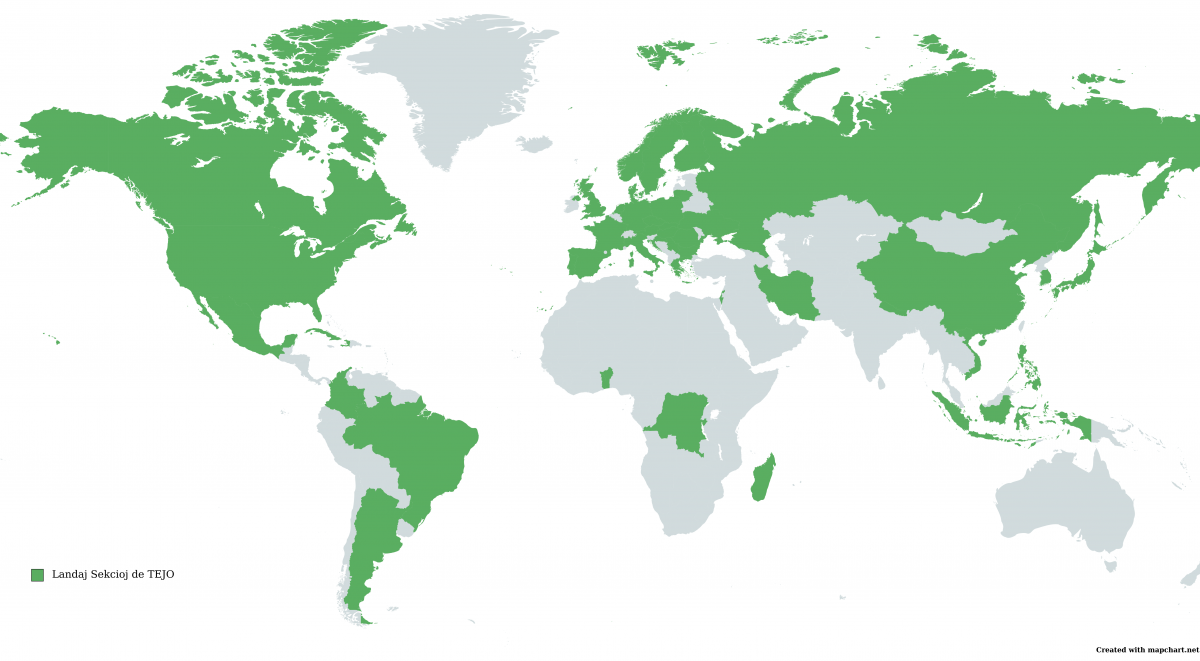
The National Sections play an important role in TEJO. The committee of TEJO, for example, consists of delegates from these National Sections and they, together with other delegates, decide the course of TEJO.
We are always pleased to welcome new National Sections (which is usually the case that each Country is entitled to one National Section). There are a few criteria for the application of new National Sections: with reference to the Regulations of TEJO (available only in Esperanto), Chapter 2 – Statute, Article 8 – National Sections:
- it unites young Esperantists within national boundaries;
- it supports the goals of TEJO;
- it can be either a separate or integrate part of a national association registered with the UEA;
- it is organised according to the law of the country concerned;
- its membership is open to all without limitations of nationality, race, gender, sexual orientation and expression, disabilities, religion, political affiliations, social background or language;
- membership in it is without coercion; and
- it is democratically led.
If you wish to find a new National Section, or if you are the new leader of a National Section, please read the tasks and responsibilities for the leaders of National Sections (only available in Esperanto).
| Country | National Section in Esperanto (abbreviated) | Activity |
| Argentina | Juna Esperantistaro Argentina (JEA) | |
| Austria | Aŭstria Esperanto Junularo (AEJ) | |
| Benin | Benina Organizo de Junaj Esperantistoj (BOJE) | |
| Brazil | Brazila Esperantista Junulara Organizo (BEJO) | |
| Britain | Junularo Esperantista Brita (JEB) | |
| Bulgaria | Bulgara Esperanto-Junularo (BEJ) | |
| Burundi | Junulara Esperantista Burunda Organizo (JEBUO) | |
| Czech Republic | Ĉeĥa Esperanto-Junularo (ĈEJ) | |
| China | Ĉina Junulara Esperanto-Asocio (ĈJEA) | |
| Denmark | Dana Esperanta Junulara Organizo (DEJO) | |
| Philippines | Filipina Esperanto-Junularo (FEJ) | |
| Finland | Finnlanda Esperantista Junulara Organizo (FEJO) | |
| France | Junulara Esperantista Franca Organizo (JEFO) | |
| Germany | Germana Esperanto-Junularo (GEJ) | |
| Greece | Junulara Sekcio de HEA | |
| Haiti | Haita Esperanto Junulara Asocio | |
| Spain | Hispana Esperantista Junulara Societo (HEJS) | |
| -Catalonia | Kataluna Esperanto-Junularo (KEJ) | |
| Honkong | Honkonga Junulara Esperanto-Asocio | |
| Hungary | Hungara Esperanto-Junularo (HEJ) | |
| Iran | Irana Esperantista Junulara Organizo (IREJO) | |
| Indonesia | Indonezia Esperantista Junulara Organizo | |
| Israel | Junulara Esperanto-Ligo en Israelo (JELI) | |
| Italy | Itala Esperantista Junularo (IEJ) | |
| Japan | Japana Esperanto-Junularo (JEJ) | |
| Canada | Junularo Esperantista Kanada (JEK) | |
| Quebec | Kebekia Esperantista Junulara Organizo | |
| Colombia | KolombEJO | |
| Congo (Dem. Rep.) | Demokratia Kongolanda E-ista Junulara Organizo | |
| Korea, Rep. | Korea Esperanto-Junularo (KEJ) | |
| Croatia | Kroatia Esperanto-Junulara Asocio (KEJA) | |
| Cuba | Junulara sekcio de KEA (JSK) | |
| Latvia | Litova Esperantista Junulara Ligo (LEJL) | |
| Madagascar | Junulara Esperantista Organizo de Madagaskaro (JEOM) | |
| Mexico | Meksika Esperanto-Junularo (MEJ) | |
| The Netherlands | Nederlanda Esperanto-Junularo (NEJ) | |
| Nepal | Nepala Esperanto-Junulara Organizo (NEJO) | |
| Norway | Norvega Junularo Esperantista (NJE) | |
| Poland | Pola Esperanto-Junularo (PEJ) | |
| Portugal | Portugala Esperanto-Junularo (PEJ) | |
| Romania | Rumana Esperantista Junulara Asocio (RumEJA) | |
| Russia | Rusia Esperantista Junulara Movado (REJM) | |
| Serbia | Serbia Esperanto-Junulara Organizo (SerbEJO) | |
| Slovakia | Slovakia Esperanta Junularo (SKEJ) | |
| Sweden | Sveda Esperantista Junulara Unuiĝo (SEJU) | |
| Tanzania | Junulara Esperantista de Tanzanio Organizo | |
| Togoland | Junulara Organizo de Togolandaj Esperantistoj (JOTE) | |
| Ukraine | Ukrainio Ligo Esperantista Junulara (ULEJ) | |
| USA | Usona Esperantista Junularo (USEJ) | |
| Vietnam | Vjetnama Esperanto-Junularo (VEJO) |
